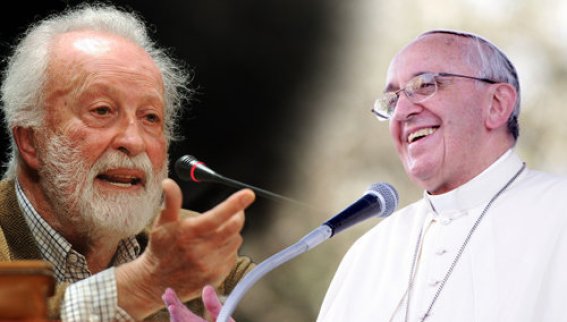‘We all adore the same God’… This type of expression, of significant theological imprecision, is often to be heard when people from different religions engage in careless ecumenical chatter. But, to be a little more precise, how can the Triune God, be the same deity preached by Islam, for example? If there is no Catholic God, who do we Catholics adore?
Francis

Quote AQuote BQuote C And I believe in God, not in a Catholic God, there is no Catholic God, there is God and I believe in Jesus Christ, his incarnation. Jesus is my teacher and my pastor, but God, the Father, Abba, is the light and the Creator. This is my Being. Do you think we are very far apart? (Interview with Eugenio Scalfari, October 1, 2013)
Note 1: The authors of this study are aware that the Vatican Press Office has denied the interpretations that some media sources have attributed to certain affirmations contained in the interviews of Francis with Eugenio Scalfari. On the other hand, it is noteworthy that some of these sources are still published on the Vatican website (found by clicking on the links of the articles), lending an official air to their content, seemingly with the approval of Francis himself. In the midst of all the turmoil and confusion caused, we always feel that a presentation of the true doctrine should be made with clarity, together with such affirmations. We must not forget that the majority of the public read only the titles that the media publishes, and, as we know, the latter frequently manipulate the truth. Consequently, it appears that a mere declaration that the content of these interviews does not correspond with the textual words of Francis, is simply not sufficient. As such, we publish this article with the intention of clarifying and orienting the faithful, who have always been the principle objective of this page, as we expressed in our letter of presentation. In this way, each one can make a correct judgment, having beforehand attained knowledge of the truth.  Print screen of the Interview in the Vatican page, June 21, 2017 Dear brothers and sisters, we are never alone. We can be far away, hostile; we can even profess that we are “without God”. The Gospel of Jesus Christ however, reveals to us that God cannot be without us: He will never be a God “without man”. It is he who cannot be without us, and this is the great mystery! God cannot be God without man: this is a great mystery! And this certainty is the source of our hope, which we find safeguarded in our every invocation of the Our Father. (General audience, June 7, 2017)
[Francis]: That is why the Spirit is the author of unity among Christians. That is why unity comes about on our journey, because unity is a grace that one should ask for, and that is why I also repeat that all proselytism among Christians is sinful. The Church never grows due to proselytism but rather “by attraction”, as Benedict XVI said. Proselytism among Christians, therefore, is in itself a grave sin. [Avvenire]: Why? [Francis]: Because it contradicts the very dynamic of how to become and continue being Christian. The Church is not a soccer team looking for fans.(Interview with Avvenire, November 18, 2016 – English summary) |
Teachings of the Magisterium
![]()
Enter in the various parts of our study
<strong>Authors</strong>
Related studies
22 - The Divinity will be in every soul and everything will be in all 35 - God is not a magician, capable of making everything 65 - If some of you don’t pray because you don’t believe or it goes against your conscience, please send positive vibes my way 87 - We, the descendents of Abraham according to our faith in you, the one God, Jews, Christians and Muslims, humbly stand before you. May everything be to your glory and honor and for our salvation. Praise and eternal glory to you, our God! 99 - Those who are Christians with the Bible and those who are Muslims with the Koran, with the faith you have received from your fathers. There is one single God, the same God




This should be linked to every Catholic website!
Thank you! Please pray for all of us. And do pass the word around…